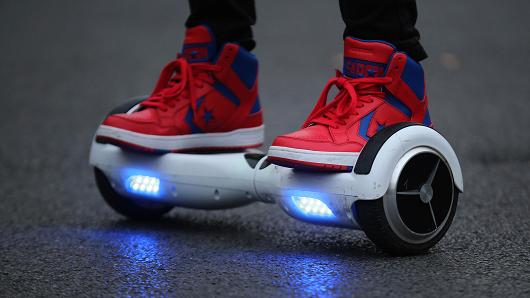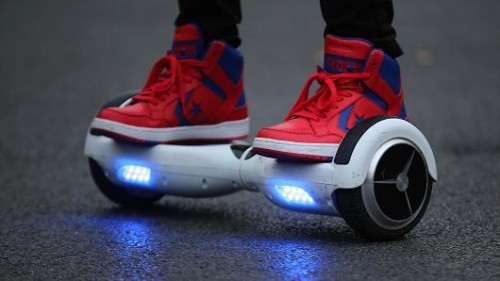If you got a hoverboard for Christmas, getting your new “it” gift home on the plane is going to be a problem.
Most all domestic airlines have banned from both carry-on and checked baggage and an increasing number of international carriers have done the same.
Here are the highlights of a story on flying with hoverboards I wrote for CNBC.
Fears about the device stem primarily from their potentially combustible batteries, and the unreliability of poorly made knockoffs and counterfeit batteries have heightened concerns.
For those reasons, Alaska Air, United Airlines, Delta and American began banning hoverboards this month from carry-on and checked baggage.
“Most of the issue is [with] the lithium batteries that are used to power them,” said aviation security expert Jeff Price. “Some manufacturers aren’t accurately reporting the power of the batteries, and airlines generally dislike lithium batteries anyway as they have a tendency to overheat and catch fire.”
Ahead of the end-of-year travel rush — when some travelers may be attempting to make their way back home with newly gifted hoverboards, United spokesman Charles Hobart said the airline was actively “working with customers if they need additional time to find alternate shipping methods for their hoverboards.”
Likewise, Delta spokesman Morgan Durrant said the carrier was advising fliers to take care of shipping a hoverboard before they arrive at the airport.
“We offer our sympathies for those who might find themselves with an inconvenience after opening their holiday loot,'” he said.
Many international airlines, including British Airways, Qatar Airways, Singapore Airlines and Air New Zealand, have newly implemented hoverboard bans in place.
“We did a review independently of other airlines and came to the assessment that actually there is a risk with hoverboards and it not a risk we’re prepared to carry,” said ANZ CEO Christopher Luxon.
Federal regulations, meanwhile, make for a confusing playing field.
A TSA representative said the Federal Aviation Administration and the airlines – not the TSA – bear the responsibility for enforcing hoverboard bans because “this is a safety, not a security, issue.”
Hoverboard makers defend the safety of their products, but some are sympathetic to the airlines’ position.
“I wouldn’t feel safe having my kids on a plane without knowing the devices were safe either,” said John Soibatian, president of IO Hawk, one of the major hoverboard manufacturers.
Soibatian said his company’s personal mobility devices are reliable and rigorously tested, and that cheaper, off-brand products are causing the problems.
“If someone’s kid wants one of these, you see ours for $1,800, you see a knockoff for $300 and it’s the knockoffs being put together by people who have no business in this industry that are exploding or catching fire,” said Soibatian.
“We’re working with Customs and Border Control to make sure fake products don’t make it to the market and with a little bit of education I think some of these airlines will change their policies,” he said.
Travelers who try to ship hoverboards, balance wheels and other devices powered by lithium batteries via United Parcel Service or the U.S. Postal Service may encounter barriers as well.
Out of “an abundance of caution and in line with major retailers and the airline industry,” the Postal Service issued a statement limiting the shipment options for motorized balance boards. USPS alerted customers that it “will ship hoverboards using only Standard Post/Parcel Select. This product travels on ground transportation, due to the potential safety hazards of lithium batteries.”
Earlier this week, UPS issued a reminder notice to customers noting that “the boards are made with a medium-sized lithium battery that when shipped via an air service become federally regulated. Due to these regulations, only shippers with an active UPS Hazardous Materials Contract may send hoverboards using an air service.”
Airports are also barring travelers from using hoverboards.
Hoverboards look cool, but don’t bring them to TPA. We've joined many airports/airlines in banning them on campus. pic.twitter.com/hNRT7BaZ1F
— Tampa Intl Airport (@FlyTPA) December 18, 2015
For safety, hover boards are not permitted for use on airport property. Most airlines now ban them on board aircraft. #CHStraveltip
— CharlestonSC Airport (@CHS_Airport) December 21, 2015
Tampa International, Charleston International and Minneapolis-St. Paul International are among a growing number of airports reminding passengers to leave their hoverboards at home.
Miami International Airport bans the use of hoverboards inside the airport, under a rule that also prohibits people from riding or driving a unicycle, a go-cart, roller skates, Rollerblades, or a skateboard at the airport.
Perhaps that why a few days before Christmas, MIA already had a few hoverboards in the lost and found.
Thanks for visiting Stuck at the Airport. Subscribe to get daily travel tidbits. And follow me on Twitter at @hbaskas and Instagram.

